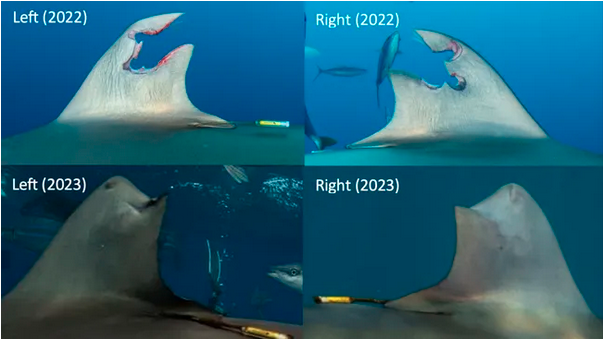Super JAWS: Shark regrows fin damaged by human activity
Researchers have discovered that a resilient silky shark exhibited remarkable regenerative abilities by growing back a portion of its fin following a traumatic encounter with humans near Jupiter, Florida.
In June 2022, a satellite tag was affixed to the dorsal fin of the silky shark (Carcharhinus falciformis) for migration tracking purposes. A few weeks later, an unidentified individual removed the tag, leaving the shark with a severe wound. Diver John Moore noticed the missing tag and alerted researchers, leading to the revelation of a substantial hole where the tag had been.
The shark's dorsal fin healed and regrew over a year. (Image credit: Photos by Josh Schellenberg and John Moore)
Despite the extensive injury, doctoral student Chelsea Black from the University of Miami, who is a study author, did not anticipate seeing the shark again, as tracking became impossible. Astonishingly, nearly a year later, the shark returned to the same waters, displaying a rejuvenated, albeit slightly stumpy, fin.
Chelsea Black expressed her astonishment, stating, "It was shocking! My first reaction was relief that the shark was still alive, as that was a traumatic wound that could affect his swimming ability or create a significant infection."
The silky shark with a wounded dorsal fin in July 2022. (Image credit: Josh Schellenberg)
This incident marks the first documented case of a silky shark regrowing its dorsal fin and only the second recorded instance of dorsal fin regeneration in any shark. The findings were published in the Journal of Marine Sciences on December 14.
Silky sharks, reaching lengths of around 10 feet (3 meters), inhabit the Atlantic, Pacific, and Indian oceans. Despite their vulnerability to extinction due to overfishing, capturing or killing them is prohibited in Florida.
The silky shark in June 2023. (Image credit: Josh Schellenberg)
The injuries inflicted on the shark in 2022 were precise cuts aligning with the satellite tag's outline, suggesting deliberate removal by humans using a sharp object. Chelsea Black speculates that the motivation behind removing the tag was likely not to aid the shark but perhaps to sell the tag or prevent scientific study.
Documenting the rare fin regeneration involved analyzing diver photographs taken 322 days apart. The images revealed that the shark initially lost 20.8% of its fin but healed back to 87% of its original size.
The silky shark had hooks in its mouth when sighted again in 2023. (Image credit: John Moore)
Researchers are still unraveling the mysteries of shark fin regeneration, given its rarity. While Black believes the new fin is mainly composed of scar tissue, confirmation awaits as no one has ever dissected a regenerated shark fin.
Sharks, accustomed to frequent injuries from aggression and predation attempts, have evolved to heal rapidly, employing immediate anti-inflammatory responses to injuries, according to the study. Chelsea Black emphasized the resilience of sharks, illustrating their ability to endure and adapt over millions of years of evolution.
If you would like to write for The Daily Jaws, please visit our ‘work with us’ page
For all the latest Jaws, shark and shark movie news, follow The Daily Jaws on Instagram, Twitter and Facebook.




